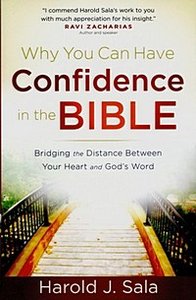Someone asked if I could recommend any good, readable (not too academic) books that deal with the authority and reliability of Scripture. I thought I’d share my recommendations, picking up on the “readable, not too academic” aspect.
You Can Trust the Bible, by John Stott, 94 pages.
Why We Believe the Bible, by John Piper (DVD and study guide)
The Book of God graphic novel
Evidence that Demands a Verdict, by Josh and Sean McDowell, 880 pages, for someone wanting something thorough and detailed, yet still readable.

A unique treatment of this subject is Why You Can Have Confidence in the Bible by Harold Sala, different enough that I will comment on it.
Instead of just writing about the value and importance of the Dead Sea scrolls in confirming the fidelity of ancient manuscripts, Sala tells the story of their discovery. He tells the story of Tischendorf, who rescued priceless findings when he found the monks at Saint Catherine's Monastery heating their room by burning the pages of some of the most ancient biblical manuscripts in existence.
Sala tells many more stories, ancient and modern. Some readers will think, “Why tell me these stories? I just want the facts.” But those who enjoy the stories will engage the facts (which are definitely included) with more interest. It is 272 pages, but they are very easy reading, and memorable.
You can preview the book on Amazon. There you will see his writing style. Now, I think there are too many stories in this early material. As interesting as Admiral Byrd’s story of the fixed reference point is, and Barna’s stats about how few people read the Bible, and the impact of the Da Vinci Code in undermining faith in Scripture, I found myself wanting to get more quickly to the main purpose of the book. However, Sala does get there, and most of the subsequent stories do serve a good purpose. It is certainly unique and would be a great fit for some readers.
Photo: Unsplash




